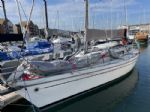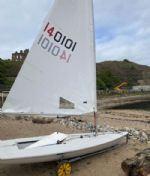












Boats for sale
| Laser 28 - Excellent example of this great design Hamble le rice |
 |
| Laser 140101 Tynemouth |
 |
| Rossiter Pintail Mortagne sur Gironde, near Bordeaux |
 |
List classes of boat for sale |
Android Start Line Apps Anyone? |
Post Reply 
|
Page <123 |
| Author | ||
RTFM 
Groupie 
Joined: 23 Nov 10 Online Status: Offline Posts: 41 |
 Post Options Post Options
 Quote Quote  Reply Reply
 Topic: Android Start Line Apps Anyone? Topic: Android Start Line Apps Anyone?Posted: 25 Feb 13 at 10:22pm |
|
|
>>To get relative postions with any great accuracy, you have to make sure the receivers are prioritising
>>the same satellites. That is how Differential GPs gets much better accuracy. Not quite correct. If I may explain... Differential GPS involves the cooperation of two receivers, one that's stationary and another that's roving around making position measurements. The stationary receiver is the key. It ties all the satellite measurements into a solid local reference. Remember that GPS receivers use timing signals from at least four satellites to establish a position. Each of those timing signals is going to have some error or delay depending on what sort of perils have befallen it on its trip down to us. Since each of the timing signals that go into a position calculation has some error, that calculation is going to be a compounding of those errors. Luckily the sheer scale of the GPS system comes to our rescue. The satellites are so far out in space that the little distances we travel here on earth are insignificant. So if two receivers are fairly close to each other, say within a few hundred kilometers, the signals that reach both of them will have traveled through virtually the same slice of atmosphere, and so will have virtually the same errors. Differential GPS can eliminate all errors that are common to both the reference receiver and the roving receiver. These include everything except multipath errors (because they occur right around the receiver such as masts and sails etc) and any receiver errors (because they're unique to the receiver). That's the idea behind differential GPS: We have one receiver measure the timing errors and then provide correction information to the other receivers that are roving around. That way virtually all errors can be eliminated from the system, even the pesky Selective Availability error that the DoD can put on if they so wish... Hope that helps...
Edited by RTFM - 25 Feb 13 at 10:28pm |
||
|
Nobby.
|
||
 |
||
RS400atC 
Really should get out more 
Joined: 04 Dec 08 Online Status: Offline Posts: 3011 |
 Post Options Post Options
 Quote Quote  Reply Reply
 Posted: 25 Feb 13 at 11:25pm Posted: 25 Feb 13 at 11:25pm |
|
Yes, that helps me see that you don't really know very much about precise GPS. I suggest you set up a mock start line and see what happens. Any time spent on Android apps could be more profitably be spent I think. |
||
 |
||
sargesail 
Really should get out more 
Joined: 14 Jan 06 Location: United Kingdom Online Status: Offline Posts: 1459 |
 Post Options Post Options
 Quote Quote  Reply Reply
 Posted: 25 Feb 13 at 11:27pm Posted: 25 Feb 13 at 11:27pm |
|
Indeed - even differential GPS can involve two moving receivers.
|
||
 |
||
RTFM 
Groupie 
Joined: 23 Nov 10 Online Status: Offline Posts: 41 |
 Post Options Post Options
 Quote Quote  Reply Reply
 Posted: 26 Feb 13 at 7:50am Posted: 26 Feb 13 at 7:50am |
|
|
So what part of my Differential GPS explainiation do not understand? In did not say anthing about precise GPS - that's RTK which I assume you also no nothing about...
|
||
 |
||
RS400atC 
Really should get out more 
Joined: 04 Dec 08 Online Status: Offline Posts: 3011 |
 Post Options Post Options
 Quote Quote  Reply Reply
 Posted: 26 Feb 13 at 5:10pm Posted: 26 Feb 13 at 5:10pm |
|
I was using precise GPS in its general sense, not in a proprietary sense. I wouldn't expect anyone who can't spell 'know' to appreciate the difference though. However, let's put all that aside, this is not the place for this discussion. Would you agree that the OP is wasting his time with a simple GPS ap to tell if a dinghy is over the line? |
||
 |
||
Post Reply 
|
Page <123 |
| Forum Jump | Forum Permissions  You cannot post new topics in this forum You cannot reply to topics in this forum You cannot delete your posts in this forum You cannot edit your posts in this forum You cannot create polls in this forum You cannot vote in polls in this forum |
Bulletin Board Software by Web Wiz Forums® version 9.665y
Copyright ©2001-2010 Web Wiz
Change your personal settings, or read our privacy policy
Copyright ©2001-2010 Web Wiz
Change your personal settings, or read our privacy policy











 Printable Version
Printable Version Delicious
Delicious Digg
Digg Facebook
Facebook Furl
Furl Google
Google MySpace
MySpace Newsvine
Newsvine reddit
reddit StumbleUpon
StumbleUpon Twitter
Twitter Windows Live
Windows Live Yahoo Bookmarks
Yahoo Bookmarks Topic Options
Topic Options